 By Appa the Gypsy
By Appa the Gypsy
To make up for not posting in June and July, I’ve done a two-part book recommendations post for you guys, so to continue on from my previous post, I’m discussing the authors who came along as guests to the Supanova convention in Perth at the end of June. If you want to read about the first part of this post, in which I talk about the awesomeness of meeting Raymond E. Feist, Juliet Marillier and Kylie Chan, you can click here to find it.
So, the last four authors who were at Supanova were all authors I’d heard less or basically nothing about, prior to hearing them speak at the panels. Each and every one of them, however, was still able to make me ever so keen to pick up their books and start reading, so much so that I spent more money than I care to admit buying their books at the convention.
So, despite having never read any of their work before, I’ve decided that after hearing them discuss their work, their writing processes, and what makes them tick, I feel like I’m already so excited to tell you guys about their books anyway. That said, though, the plan is for me to attempt to power through some of their work, so I can follow this post up later in the year and recommend their books to you for real once I’ve read them.

Trudi Canavan:
Of all the authors who were at Supanova, Trudi Canavan’s books are the ones I decided to start reading first. I’m only a few chapters into her Black Magician Trilogy’s first book, The Magicians’ Guild, but I already like it so much. I appreciate that the book didn’t mess around with a vague, uninformative prologue or an overload of information about the world. It drops you in the middle of the world and lets you get to know the people and the places the same way you would if you were new to any city. Fantasy novels often lose me in their opening chapters because they try to introduce you to their world all at once, and it’s always a challenge for me to work past those opening parts, so this was a refreshing change. The book has been fast-paced, easy to read, and fantastically interesting. I’ve been enjoying her quick-witted and clever writing style, and I’m excited to keep reading.
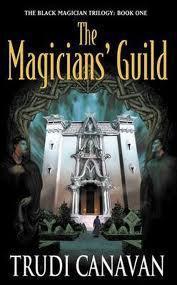
Black Magician Trilogy: Magicians’ Guild
Trudi explained during the panels that the question she asked herself as she began writing the Black Magician Trilogy was What if magic was a skill that could only be taught by another magician? Then those magicians would band together and could become both politically and magically powerful. If they formed a society of their own, they could pick and choose where their apprentices came from, and teach them how they wished. Would they not then choose their students only from the higher classes of society, where becoming a magician would be a prestigious opportunity amongst the noble families and bring more money to the magician’s society, or guild? So, what happens when a girl from the slums discovers her powers on her own, without the help of the Magicians’ Guild? What kinds of political questions would the pose and how would it upset the balance of power, when people begin to realize that magic exists in the world outside the influence of the Magicians’ Guild?
I found these concepts fascinating, which is what drew me to read her books first, but I also found her to be interesting to listen to during the panels. She seemed soft-spoken and quiet, but her dedication and passion for her writing was evident when she spoke. She provided lots of food for thought at the panels, and she must have been doing something right, if she could convince me to pick her book up first out of all the amazing authors who were present at the conventions.
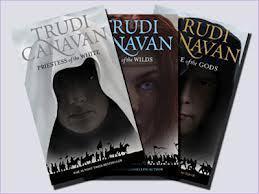
Age of Five Trilogy
Right, so below I’ve listed her works, which include the Kyralia Series, containing a prequel novel and two trilogies, and the Ithania Series, which includes just one trilogy at this point. She’s got another series on the way for next year, called Millenium’s Rule, and I’m sure I’ll be just as excited to read that one as I am to look into her books that have already been published.
Kyralia series:
The Black Magician Trilogy
- The Magicians’ Guild
- The Novice
- The High Lord
- The Magician’s Apprentice (prequel stand-alone novel to the Black Magician Trilogy)
The Traitor Spy Trilogy
- The Ambassador’s Mission
- The Rogue
- The Traitor Queen
Ithania series:
The Age of the Five Trilogy
- Priestess of the White
- Last of the Wilds
- Voice of the Gods

Colin Taber:
This guy blew my mind. He spoke mostly about a series he’s currently writing, which sounds like a massive undertaking, and had the other author’s looking pretty gob-smacked while he was explaining it.
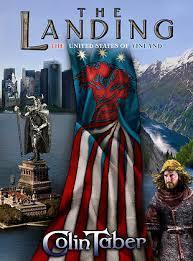
United States of Vinland: The Landing
The series is called United States of Vinland, and it’s basically an alternate history series in which the Vikings settled the U.S. before the English even got there. How would this change the world, if America still became just as powerful, politically and economically, as it is today? Would we still have had two world wars? What do the United States look like when the bible belt worships the Norse Gods instead? Colin Taber has decided to answer these questions by writing an epic series that covers centuries and centuries of time, and you get to watch as those first settlers go from characters you know and love to the most loved or even most hated historical figures of the New World as the centuries pass.
Holy moly, right? Mind. Blown.
Listening to this guy talk about this massive concept had everyone’s jaws dropping, from audience members to the authors on the panel with him. It. Sounds. Amazing. Extensive and vast and historically engaging, watching as historical events from our world happen in this alternate reality, from natural disasters to wars, and watching how differently things turn out, even with these markers guiding the historical timeline.
Not the kind of thing I’d normally read, I’ll admit it, but I am so willing to give it a try, just because the author made it sound so ridiculously awesome when he described it to us, and as he discussed it with us. I’ve never been so keen to pick up a book from a genre I don’t normally delve into. Ever.
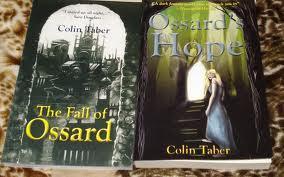
Published books of the Fall of Ossard Trilogy
Anyway, so Colin Taber has written quite a few novels at this point, including the Ossard Trilogy, as well as the first novel of the United States of Vinland series, which I’ve been discussing above. Despite being quite an established author, the guy has no Wikipedia page, which had me absolutely stumped trying to find a list of his works. But I got there, and the list is below for you guys to check out. He’s still working on both series at this point, but if you click the titles of some of the books, you might get a sneak peak of the opening chapters…
Ossard Trilogy:
- The Fall of Ossard
- Ossard’s Hope
United States of Vinland:

Jana Oliver:
Jana Oliver was awesome. I loved listening to her, and conversations between her and Kylie Chan were just plain gold on the panels. They were rather amusing together. So, obviously I enjoyed listening to Jana on the panels. I thought she was great. She’d also traveled quite a distance to get to Supanova, since she came from the U.S. I had the opportunity to talk to her for quite a while when I got my copy of her book signed. We had an interesting talk about what careers she’d had before she took up full time writing, and the correlation in the U.S. between being able to afford health insurance and being able to work as a writer. It was interesting to discuss it with her, although I’m sure most wouldn’t agree, but I’m always interested to learn about what leads writers to begin writing full-time and how that’s possible for them.
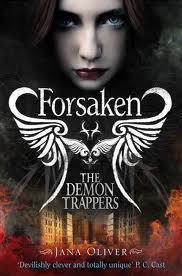
Forsaken, titled Demon Trapper’s Daughter in some versions
Anyway, so she focussed mostly on her Demon Trappers series in the panels, despite it not being her only series. It’s an interesting concept. When asked what her What if moment was that led her to writing the series, she said that her springboard had been asking herself what would happen if a girl wanted to become a demon trapper in a world where there were no other female demon trappers? How would she learn and who would help her achieve her goal? Sounds like a pretty cool concept to me, and one that would address some interesting issues, particularly in terms of gender, obviously.
One thing that Jana discussed, which I found really interesting, was that she tends to cut herself off from certain aspects of popular culture while working on her novels. So, while writing the Demon Trappers series, she couldn’t watch shows or movies that contained similar concepts, like Supernatural. She admitted this led to her watching a lot of reality television, and finding that her to-read pile began to get ridiculously high. In the Reimagining Fairytales panel she did with Juliet Marillier, she discussed how she has been cutting herself off from watching things like Once Upon a Time and Grimm, while she was working on her fairytale retelling of ‘Sleeping Beauty’, Briar Rose. In this novel, which is coming out later this year, she tells the story of what happens to a modern day Sleeping Beauty while she’s sleeping. What if her sleep was more than just a magic spell? What if her dreams were out to kill her? Sounds wonderfully eerie, and I know I’m looking forward to its release later this year.
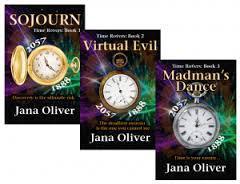
Time Rovers Trilogy
Anyway, I’ve written up a list of her published works below, but Jana Oliver is a hard working writer, and looking at her blog, it seems like she’s got books coming out left right and centre, and more still on the way, for which I’m super excited, because they all sound awesome. Some of the books have different titles because of publishing changes and such, and that confused me a bit, so I tried to list them if found out what they were.
Time Rovers
- Sojourn
- Virtual Evil
- Madman’s Dance
Demon Trappers
- The Demon Trapper’s Daughter OR Foresaken
- Soul Thief OR Forbidden
- Forgiven
- Foretold

Jay Kristoff:
Jay Kristoff was the only debut author on any of the novelist panels at Supanova, which I think is super cool, and doing conventions when all you’ve got to talk about is your first novel must be both terrifying and absolutely awesome, especially when you’re sitting next to Raymond E. Feist at a panel about epic fantasy. What I both liked and disliked about this guy is that I’m not entirely sure what he did to make me buy his book. I think he got me while I was still recovering from my visit to the WETA workshop’s stall and my depressing realisation that I couldn’t afford to buy the Evanstar or a Fellowship cloak pin. But he was at the book stall and he talked to me for a bit, and I somehow spent the last of my money on his book. Now that’s what I call a good sales technique.
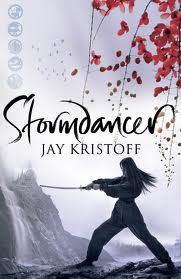
Now, I could tell you a bit about him myself, but I found a bio on his website that he appears to have written himself, and I felt that it might actually be impossible to say it better…
“Jay Kristoff is a tragic nerd, but has spent the last ten years dumping expeez into his Intimidation stat, with the result that nobody is brave enough to say it to his face. He grew up in the second most isolated capital city on earth and fled at his earliest convenience, although he’s been known to trek back for weddings of the particularly nice and funerals of the particularly wealthy. He spent most of his formative years locked in his bedroom with piles of books, or gathered around dimly-lit tables rolling polyhedral dice. Being the holder of an Arts degree, he has no education to speak of.
Jay prostituted his writing arm in the soulless crack-house that is advertising for over ten years. He’s hocked petrol guzzling monstrosities to sexually inadequate men, salty condiments to schoolchildren, and toilet paper to anyone with a bottom. He has won several awards that nobody outside the advertising industry gives a toss about.
Jay is 6’7 and has approximately 13870 days to live. He abides in Melbourne with his secret agent kung-fu assassin wife, and the world’s laziest Jack Russell.
He does not believe in happy endings.”
He does not believe in happy endings? Well, damn. That can only bode well for people who get attached to his characters…
Right, so Jay’s debut novel, Stormdancer, is a samurai steampunk… thing. I did a bad job explaining that. Ok, so it’s set in an industrial age Asiatic empire, and the empire has over-done the whole industrialisation thing, to the point that the pollution is so bad that their spirit animals have fled. When the emperor, or Shōgun, demands that the hunters of his court capture a legendary thunder tiger, the hunters fear their lives are forfeit.
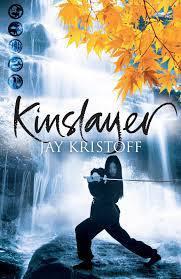
And remember… no happy endings. Good lord. Anyway, I’m a bit of a fan of the steampunk trend. I always thought that the industrial era provides an epic looking backdrop to any tale. And Kristoff uses that to his advantage in Stormdancer, combining the economic turmoil and revolution of the Industrial revolution, not with Victorian England, as one might expect, but with something way cooler and much more intriguing.
Anyway, as I said, the guy convinced me to buy his book, so I’ll definitely be reading said book, and I imagine I’ll be picking up the sequel, Kinslayer, when it comes out next month, because, let’s face it, I’m a compulsive book collector, and, frankly, I enjoyed reading Jay’s blog so much, I’m not entirely sure it’s possible for me to do anything but love his books. But we shall see.
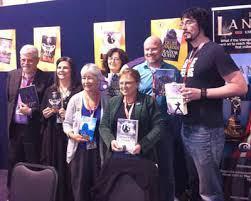
So, I’ll be checking back in with you all later in the year to tell you all about the books I’ve read by this gang of Supanova author attendees. I’ll tell you what I liked, what I didn’t like, and whether I’m inclined to keep reading their books. At this point, I find it hard to believe that I won’t want to keep reading their work, but hey. You never know.
Just to finish up, though, I’d like to say that if you have the opportunity to go to a pop-culture convention like Supanova, then go. Seriously. These events are amazing and fun and you get to meet these people who are all crazy awesome, and hear what they have to say, and it’s priceless. Well, it costs you the entry fee, I guess, but it’s priceless, too. And go see the authors! They’re amazing, and you won’t regret taking the time to hear what they have to say, whether you already know their work or not! I now know about several authors I previously hadn’t known about, and I am so glad I do. Sometimes it’s hard to decide what to read next, so why not let the people who know their books best tell you why you should read their book next?

